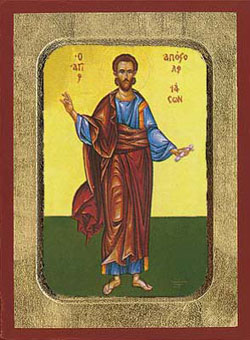
Feastday: July 12
While on his second missionary journey, St. Paul stayed at Salonika, in the house of one, Jason. In consequence of Paul's successful preaching, the Jews, "moved with envy and taking unto them some wicked men of the vulgar sort, and making a tumult, set the city in an uproar; and besetting Jason's house, sought to bring them out unto the people. And not finding them, they drew Jason and certain brethren to the rulers of the city, crying, 'They that set the city in an uproar are come hither also, whom Jason hath received. And these all do contrary to the decrees of Caesar, saying that there is another king, Jesus.' And they stirred up the people and the rulers of the city, hearing these things. And having taken satisfaction of Jason and of the rest, they let them go". This is probably the Jason referred to with Lucius and Sosipater as the kinsmen of St. Paul in his letter to the Romans, and in the Greek legend he is represented as bishop of Tarsus in Silicia, going with St. Sosipater, bishop of Iconium, to Corfu, evangelizing that Island, and dying there. After preaching successfully for some time, the two missionaries were thrown into prison, where they converted seven thieves who afterward achieved martyrdom. The Syrians, however, venerate Jason as the apostle of the district round Apanea and as a martyr who was thrown to the beasts. The Roman Martyrology wrongly identifies him with the Mnason of Acts xxi 16, "an old disciple" with whom St. Paul was to lodge in Jerusalem, and makes Cyprus the place of his death as well as of his birth. His feast day is July 12.
Jason of Thessalonica was a Jewish convert and early Christian believer mentioned in the New Testament in Acts 17:5–9 and Romans 16:21. According to tradition, Jason is numbered among the Seventy Disciples.
Jason is venerated as a saint in Catholic and Orthodox traditions. His feast day is July 12 in the Roman Catholic Church, April 28 in the Slavic Christian tradition, and April 29 in the Greek Christian tradition. His feast is celebrated on the 3rd of Pashons in the Coptic Orthodox Church. Finally, he is commemorated on January 4 among the Seventy Apostles.
Biblical account
In Acts 17 his house in Thessalonica was used as a refuge by the apostles Paul, Silas, and Timothy. Non-believing Jews in Thessalonica stirred up a riot and Jason was arrested when the city authorities could not locate Paul nor Silas, and was made to post bail.
Paul referred to Jason, Lucius and Sosipater as his "countrymen" (Greek: οἱ συγγενεῖς μου) in Romans 16:21, which has led some to call him "Jason of Tarsus" (since Paul was from Tarsus). However, most scholars understand Paul's use of "countryman" here and elsewhere to mean "fellow Jew". Both references to Jason point 'very probably' to the same person.
Hagiography
The literary source (hagiographic legend) of the life of Jason and Sosipater was newly edited and translated by B. Kindt as appendix to "La version longue du récit légendaire de l'évangelisation de Corfou par les saints Jason and Sosipatre," Analecta Bollandiana 116 (1998) 259–295.
Born in Tarsus, he was appointed Bishop of Tarsus by the Apostle Paul. With the apostle Sosipater he traveled to the island of Corfu, where they built a church in honor of the Apostle Stephen the Protomartyr and converted many pagans to the Christian faith. Seeing this, the king of Corfu threw them into prison where they converted seven other prisoners to the Christian faith: Saturninus, Jakischolus, Faustianus, Januarius, Marsalius, Euphrasius and Mammius. The king had those seven put to death for their faith in boiling pitch.
The king's daughter, the virgin Cercyra, having watched these holy apostles being tortured and turned to the Christian faith, distributed all her jewels to the poor. The king became angry and put her in prison, yet she would not deny Christ. So he had the prison burned, but she remained unharmed. Many people were baptized upon seeing this miracle. He then had her killed with arrows while tied to a tree.
Many believers fled to a nearby island to get away from the enraged king, but as he chased them, his boat sank. The new king embraced the Christian faith and in baptism received the name Sebastian. From then on Sosipater and Jason freely preached the Gospel and built up the Church in Corfu until a very old age, when they gave up their souls to God.

